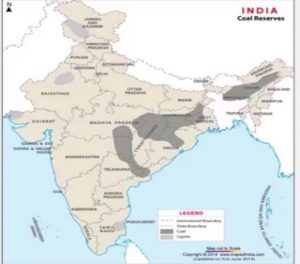Coal reserves are primarily found in the Eastern India in states of Telangana, Madhya Pradesh, Maharashtra, Jharkhand, Chhattisgarh, West Bengal and predominantly in North-East regions like Assam and Meghalaya. Despite the presence of coal reserves, commercial mining is not practiced in the North-Eastern regions because of terrain’s unsuitability as well as nature of coal deposits. Open mining cannot be practiced due to the added difficulties. Further, the coal found in North-East contains lots of sulfur. This overall reduces the energy efficiency and therefore this type of coal is categorized as bad quality of coal.

Distribution of coal in India
A rat-hole mine involves digging of very small tunnels, usually only 3-4 feet deep, in which workers, more often children, enter and extract coal. Rat-hole mining is broadly of two types – side-cutting and box-cutting.
Although the coal is of bad quality, people see it as a treasure-chest. In backward regions, where there is loss of livelihood, lack of employment opportunities and under-education, people see rat-hole mines as an opportunity to earn daily bread. People with power (also called as bahubali) employ poverty-ridden people to go into the rat-hole mines and dug out coal. A major portion of these employees are children, who are preferred because of their thin body shape and ease to access depths. This practice has become very popular in Meghalaya. Here there are majorly hilly terrains, which make coal mining very difficult. Also, digging a big hole is very difficult because big hole demands pillars and support. Since it’s a good opportunity to extract coal from there for big as well as local investors, because it involves less investment and good returns, people are drawn towards this dangerous business. The practice is to not make any professional tunnels, install pillars, and ensure safety measures, but to just dig a small tunnel and put children and labor to work.

A Rat Hole Mine – on the surface (left) and inside (right)
Rat-hole mining is primarily practiced only in Meghalaya. Such cases are not witnessed in Jharkhand and Chhattisgarh because the coal seems are thick in Jharkhand and Chhattisgarh while in Meghalaya coal seems are very thin. So, economically it is not a good idea to do an open mining, and therefore, they prefer rat-hole mining. The National Green Tribunal (NGT) has banned rat-hole mining in 2014, and retained the ban in 2015. The ban was on grounds of the practice being unscientific and unsafe for workers. The NGT order bans not only rat-hole mining but all “unscientific and illegal mining.” But orders of the Tribunal have been violated without exception since The State Government has failed to check illegal mining effectively.
Since rat-hole mining is illegal, it is practiced behind closed doors, and therefore, no one is ready to invest in infrastructure development. Coal is stored near rivers because of shortage of space which leads to pollution around water bodies. The water in the Kopili River (flows through Meghalaya and Assam) has turned acidic. The entire roadsides in and around mining areas are for piling of coal. This is a major source of air, water and soil pollution. Off road movement of trucks and other vehicles in the area causes further damage to the ecology of the area. Due to rat-hole mining, during rainy season, water gets flooded into the mining areas resulting in death of many workers due to suffocation and hunger. If water has seeped into the cave, the worker can enter only after the water is pumped out.
On December 2018, the collapse of coal mine in Meghalaya’s East Jaintia Hills, trapping at least 15 workers who were still missing and are feared dead, has thrown the spotlight on the “rat-hole mining.” Although banned, it remains the only procedure of coal mining in Meghalaya.
Few private players and some people who do invest in such mining are taking the help of Constitution to right their wrongs. They say, “Constitution’s 6th Schedule intends to protect the communities’ ownership over its land and autonomy and consent over its nature of use.” The ongoing coal mining in Meghalaya was a corruption of this Constitutional Provision. Private individuals with interests in earning monetary benefits from minerals under the land are engaged in coal mining. They are attempting to legitimize this act by claiming immunity through tribal autonomy over land ownership. In coming days, controversy over rat-hole mining in Meghalaya will increase and Central and State Government must work together in an amicable manner to stop such pathetic dehumanizing practice.
Author – Santosh Kumar

Recent Comments